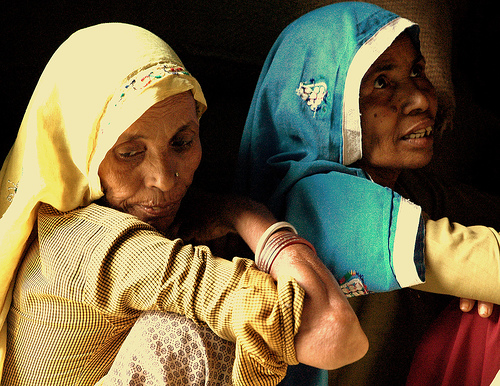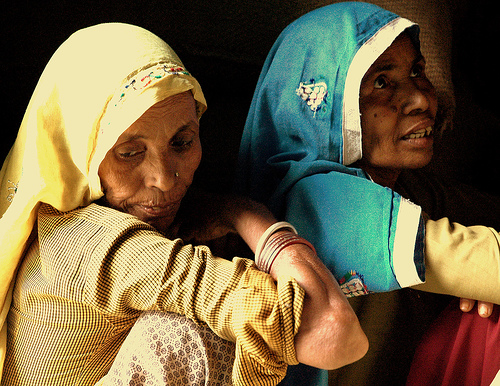Neo-Amazon warriors? Topless pop-feminists? Hijabi superheroes? Or all of the above?
Carleigh Baker
The Other Press
NEW WESTMINISTER (CUP) — Sunrise in a misty glade in the Carpathian mountains. A group of teenaged girls — barefoot, shirtsleeves rolled, long hair braided — practice their high kicks, swinging swords and scythes around with ease. At night, they sing fighting songs around the fire in a delicate falsetto. These are the Asgarda, modern warriors inspired by the tribal tradition of the Scythian Amazons of East Ukraine. Katerina Tarnouska, who adapted the Asgarda fighting style from the traditional Ukrainian dance, Gopek, has initiated nearly 1,000 girls since she founded the group in 2002.
In 2004, photographer Guillaume Herbaut spent two weeks photographing the Asgarda for his project, “Le Retour des Amazones.” The photos show girls sparring, posing with swords and axes, and shaving each other’s heads. He also captures them taking part in traditional Ukrainian ceremonies, wearing finely embroidered white dresses.
Of the scant information available on the Asgarda, mostly stemming from Herbaut’s creative reportage, a legend emerged of a cult-ish all-female utopia in the forests of Ukraine. North American girl-power rags like Jezebel picked up the story and ran with it, comparing the Asgarda aesthetic to Xena: Warrior Princess. Eager feminist bloggers envisioned them as a militia, leveling up for the big patriarchy boss fight.
With little interest in maintaining a media presence in the West, the Asgarda’s true agenda remained a mystery for several years. It wasn’t until a topless Ukrainian protest group called FEMEN caught the attention of the world media that public interest in the Asgarda was rekindled.
Despite FEMEN’s undeniable international appeal, old school feminists were not impressed with the topless troops. “They dress like prostitutes,” gender researcher Maria Dmitrieva wrote of FEMEN in a Russian magazine. “The display of bare breasts, with or without cause, is certainly not conducive to social discourse.”
FEMEN founder Anna Hutsol’s response, in German Magazine Der Spiegel, was pointed: “We’re different from classic feminists. In order to gain a voice, they had to become like men. But we want a real women’s revolution. Our naked protests are part of the fight for women’s liberation. We have the right to use our bodies as weapons. It was men who made breasts into a secret.”
There is an undeniable similarity between FEMEN and the Asgarda: both are using their bodies as weapons, though they employ very different methods. FEMEN’s agenda is clear, even if its efficacy is in question. But what exactly do the Asgarda warriors hope to accomplish? Journalists looking to cover the rise of feminism in a country famous for sex tourism were eager to answer this question, attracted to the idea of an anti-FEMEN, quietly training a feminist army for world domination while FEMEN made a shrill spectacle of themselves. You can imagine the disappointment when Tarnouska’s motives turned out to be far more nationalistic. The Asgarda are training strong women to raise the next generation of strong Ukrainian men.
In a scene from a recent mini-doc on the Asgarda, the young women talk about what kind of men they hope to marry. “We are looking for real warrior men,” they say.
“Have you found any?” the narrator asks.
“Not yet.”
When asked if she is a feminist, Tarnouska is careful to note that “feminism,” as defined in North America, does not exist in the Ukraine.
“If feminism is looked at from the viewpoint of standing up for women’s position in society, then I am a feminist. But if feminism means women are the strongest beings and against men, then no, I am not a feminist. I believe in the natural order of things. A woman’s mission is to have children.”
The journalist, a young correspondent from VICE magazine, could not hide her disappointment that the Asgarda women aren’t a little more… hardcore. In a country with a terrible history of domestic violence, surely a woman like Tarnouska would be looking to kick some patriarchal ass?
“Every strong woman is nevertheless a woman, and this is something you should never forget. It’s something to cherish and develop with your strengths. It took me a long time to understand the phrase, ‘The strength of a woman is in her weakness.’ Yes, I am a strong woman. Yes, I train. Yes, I fight. I’m an excellent organizer. I’m a good leader, a well-read person. But in a relationship, I will show my weaknesses.”
Both FEMEN and the Asgarda equate traditional feminism with a loss of femininity that they aren’t prepared to incur in order to reach their goals. Considering current popular feminist stereotypes, I think it’s fair to say they aren’t alone in this conclusion.
The Huffington Post recently offered up a feminism flow chart, suggesting that everybody should be a feminist because it’s like, totally easy to understand, you guys. You either want women and men to enjoy equal rights, or you don’t.
I don’t think any of us have a problem with that concept. It’s the difficulty defining equality across multiple cultures that’s causing trouble. The idea of a universal feminist vision may be seductive, but it’s not practical. If we don’t allow cultural nuance into our worldview, we’re bashing a square peg into a round hole.
And what happens to those who don’t want to be a part of feminism’s new world order, as defined by “dominant” culture? If you’re female, you become the subject of scorn and condescension. But when it comes to defining the rules of gender equality, there seems to be no shortage of finger-pointing going on among feminists of every stripe.
Despite their eagerness to be defined outside the realm of radical feminism, FEMEN have gone on the attack, making Muslim women their target as of late. And the word target is apt: when Muslim women did not respond to FEMEN’s call to throw down their hijabs and embrace the clearly superior ideology of their freedom-loving topless sisters, they became the sad, helpless, brainwashed objects of FEMEN figurehead Inna Shevchenko’s online rants.
“During one of the latest conferences on FEMEN that took place in Spain, one woman started to talk about ‘Muslim feminism.’ Wow! Such a gift! Even though such a term is not and can not exist as its [sic] nonsense, I was always amazed how those people are identifying themself [sic].”
Deena Mohamed, creator of Qahera, a comic strip about a hijabi superhero who combats Islamophobia and misogyny, would certainly disagree.
“Hijabi women bear the brunt of Islamophobia because they are so visibly Muslim. All the responsibilities and stereotypes of Islam are placed on their shoulders.”
This is why Mohamed felt that her superhero had to wear a hijab. “There is also very little representation of hijabi women that isn’t about their ‘oppression,’ so I hoped Qahera would be a character that hijabi women could relate to as well,” she says.
By ignoring the voices of Muslim women, Shevchenko makes the assumption that they are victims in need of salvation, incapable of making decisions for themselves. This just creates antagonism.
Globalization is not going to help the march for feminine equality. How can North American women decide what’s right for Eastern European women? And how can Eastern European women stand in judgment of Middle Eastern women? We can offer solidarity, but we can’t possibly expect to impose a unified feminist code, when to do so ignores all cultural context. Through her efforts, Tarnouska has taught nearly a thousand Ukrainian women to fight for themselves, and to seek out a strong partner who supports them; Mohamed is taking the hijab, considered a symbol of oppression by even the most well-intentioned feminists, and turning it into a symbol of strength; and Hutsol, Shevchenko, and the topless warriors of FEMEN are shaking things up, taking a stand by taking their clothes off. For better or for worse, these women are all defining modern feminism.



